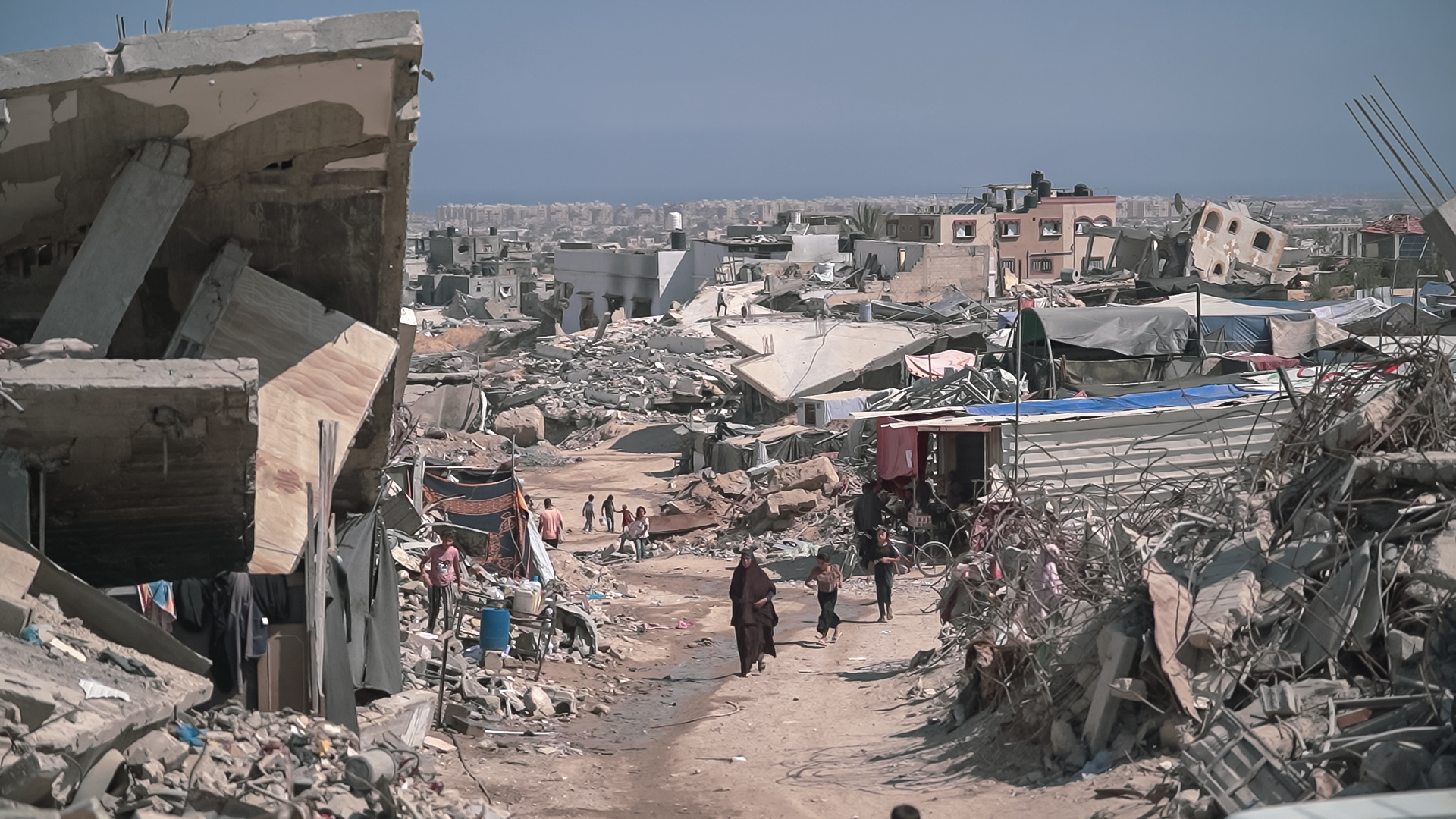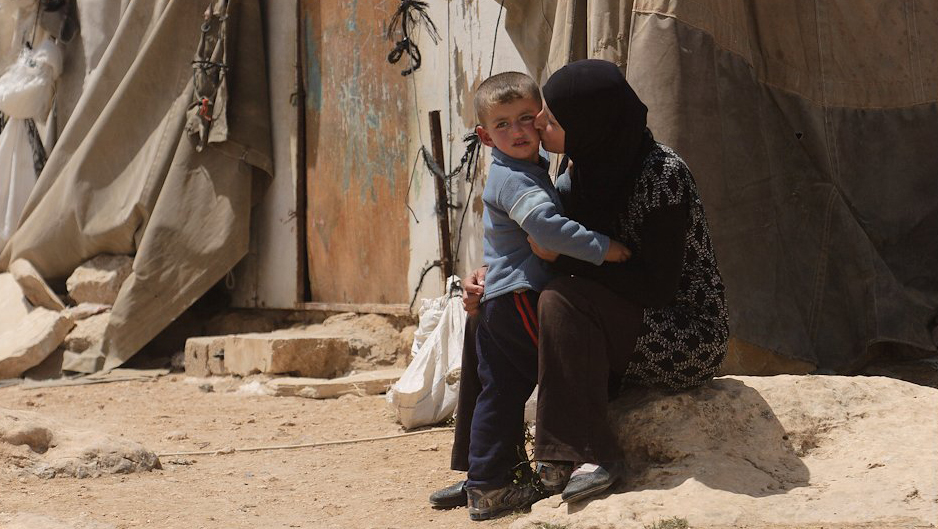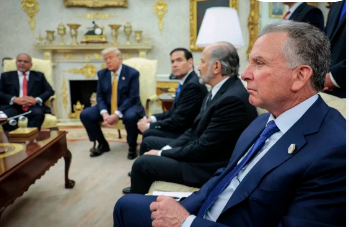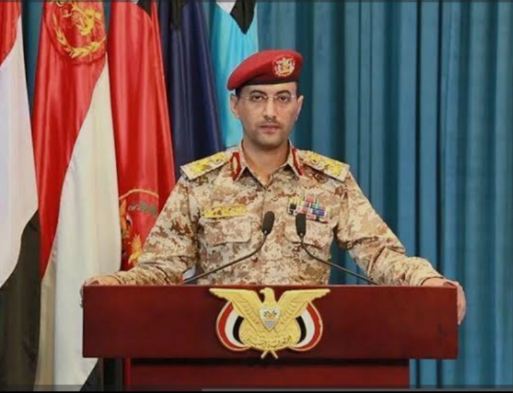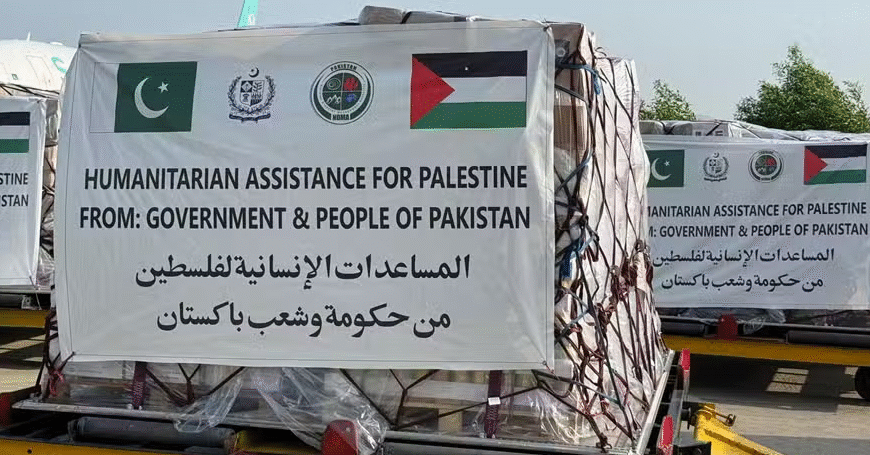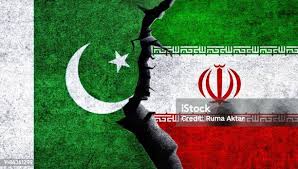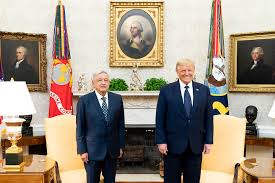Trump sayd about ceasefire discussions
Trump stated that militants “were not interested in reaching” an agreement, following the withdrawal of U.S. and Israeli negotiators from ceasefire discussions.
In light of increasing concerns regarding widespread starvation in Gaza and the distressing visuals of Palestinians enduring extreme malnutrition, the Trump administration is intensifying its rhetoric against Hamas, attributing the humanitarian crisis to the group.
President Donald Trump mentioned about hamas
on Friday
President Donald Trump mentioned on Friday that Hamas “didn’t want to make” a deal during this week’s ceasefire negotiations, and now they might be “hunted down.” The day prior, special presidential envoy Steve Witkoff stated that the United States was at least temporarily stepping back from discussions in Doha, Qatar, and would look for “alternative options” to resolve the conflict since Hamas was not “acting in good faith.”
Basem Naim, a Hamas representative, say
about Witkoff
Basem Naim, a Hamas representative, stated on Facebook that Witkoff had inaccurately portrayed a Hamas response that was “very close” to Witkoff’s own proposal. Naim remarked that the U.S. envoy, in his comments on Thursday, was “serving the Zionist position.” Israeli Prime Minister Benjamin Netanyahu expressed his approval of the U.S. announcement and committed to collaborating with Washington on alternative solutions.
The global community has intensified its criticism of Israel, whose military actions and evacuation orders have forced the majority of Gaza’s 2.2 million residents into an increasingly confined area of the enclave, while food supplies and access to them have significantly decreased. Despite occasionally expressing frustration with Netanyahu, Trump has consistently provided strong support for Israel, frequently criticizing the Biden administration for its “weak” backing and efforts to leverage military and diplomatic means to enhance humanitarian aid.
According to the United Nations, approximately one-third of Gaza’s population is going several days without food. Hospitals, already under strain, have reported an increase in deaths due to starvation and shortages of medical supplies and fuel, with increasingly distressing images of human suffering surfacing daily.
Aid organizations claim that the significant drop in food supplies to Gaza is due to Israel’s blockade of the area and, since mid-May, hindering the distribution of aid by the U.N. and other global groups across Gaza through delays in approvals and military restricted areas.
In contrast, Israel and the U.S. have endorsed a system, via the newly established Gaza Humanitarian Foundation, to distribute food at four specific locations situated in military zones and protected by U.S. security personnel.
Despite assertions from the U.S. and Israel that the negotiations collapsed due to Hamas’s unwillingness to reach an agreement, numerous analysts argue that the deadlock stems from deep-seated disagreements regarding the terms.
“Hamas is indeed seeking a deal,” stated Aaron David Miller, a Middle East specialist who has provided counsel to both Republican and Democratic administrations. Its prerequisites include a guaranteed pathway to a lasting cessation of hostilities and the withdrawal of Israeli troops; the reinstatement of extensive U.N.-coordinated humanitarian aid; and the release of Palestinian detainees in return for Israeli captives.
Israel has committed to eradicating Hamas — either through physical means or by relocating its remaining senior leaders and militants to another nation — and continues to pursue an agreement that does not obligate it to negotiate an end to the conflict if its stipulations are unmet.
“The core incompatibility lies in Hamas’s resolve to endure and Netanyahu’s vision of complete victory,” Miller remarked. The choice made by Netanyahu and Trump to withdraw their negotiating teams from the discussions, which one Middle East diplomat characterized as a strategic maneuver rather than a definitive conclusion, underscores that the Americans and Israelis will not allow the dire situation of starvation and malnutrition in Gaza to compromise their negotiating stance with Hamas, Miller noted.
On Friday, Qatar and Egypt, along with the U.S. as mediators, mentioned that they believe, “some progress was achieved during the most recent intensive round of negotiations,” and that the talks were merely put on hold. The joint statement added, “Consultations before resuming dialogue again is a normal procedure within the context of these complex negotiations.”
Trump, who has eased his stance on Ukraine partly because he was troubled by the civilian suffering from Russian attacks earlier this year, hasn’t focused much on the distressing images of starvation in Gaza and hasn’t discussed them in detail publicly lately. However, officials indicate that he is aware of the humanitarian crisis and it is affecting his choices.
According to one senior White House official, who requested anonymity to share the president’s private views on the humanitarian situation in Gaza, “Trump has seen the images and he does not like them.”
The official continued, “That’s why he instructed Witkoff to devise a creative aid/food program solution. He thinks it’s a dire situation that needs to be resolved.”
The innovative solution mentioned refers to the GHF, an initiative backed by Israel and the U.S. aimed at replacing the U.N.-coordinated aid system that has been in place in Gaza for many years, as stated by the senior official. Israel claims that the U.N. is compromised by Hamas.
Hamas, which has governed Gaza for nearly twenty years, launched an attack on Israel on October 7, 2023, resulting in approximately 1,200 deaths and the abduction of 250 individuals. The organization still retains around 50 hostages taken that day, with about 20 believed to be alive. In response, Israel has initiated a military campaign aimed at dismantling Hamas and rescuing the hostages, which has devastated much of Gaza and resulted in over 60,000 fatalities, as reported by the Gaza Health Ministry. This ministry does not differentiate between combatants and civilians but indicates that the majority of the deceased are women and children.
U.S. officials have consistently highlighted the achievements of the GHF, citing statistics that reveal it has provided over 80 million meals in packages designed to sustain 5.5 individuals for 3.5 days since late May. However, these operations have also incited disorder and violence, as crowds of civilians have been seen rushing dangerously towards distribution sites. Hundreds have lost their lives, either shot by Israeli forces who claim they are a threat or trampled in the frantic rush for food.
The U.N. and several other aid organizations have declined to join the GHF, claiming it goes against their neutrality principles and puts civilians at risk.
During virtual comments to reporters on Friday, GHF spokesperson Chapin Fay reiterated the foundation’s offer to work together, providing “free” trucks, drivers, and security escorts for U.N. convoys that frequently face attacks from desperate civilians and armed groups while attempting to deliver food and medicine.
Israel has stated that the U.N. and other organizations are welcome to distribute food, but their own ineptitude and alleged sympathies for Hamas are hindering this effort. Both Israel and the GHF assert that numerous food-filled trucks have been checked by the Israel Defense Forces and are ready just inside the enclave for U.N. collection. “This is a time for the United Nations and the whole humanitarian sector to take action, not retreat,” Fay remarked. “Let’s stop acting like there’s only one method to provide aid. … Let’s not allow organizational pride to influence operational choices. The traditional approach is failing, and ours is succeeding.”
In a letter sent on Thursday to GHF Executive Chairman Johnnie Moore, U.N. Undersecretary General for Humanitarian Affairs Tom Fletcher “reiterated that the U.N. is prepared to collaborate with any partner to ensure that urgently needed humanitarian assistance reaches the people in Gaza,” as reported by U.N. spokeswoman Stephanie Tremblay to reporters on Friday.
However, she noted that Fletcher stated, “any such collaboration must comply with the universally recognized principles of humanity, impartiality, neutrality, and independence. This implies that aid should be directed to where it is most needed and without bias, and that our accountability lies with the civilians in need, rather than the conflicting parties.” He also expressed his readiness to meet with Moore.
In a response letter released by the foundation on Friday, Moore mentioned that the “GHF is here to contribute to the solution, not to take the place of or compete with any organization, but to assist in bridging the gaps with transparency and efficiency. We are ready to set aside our differences and adapt to help people right now.” He expressed his eagerness for an in-person meeting, although there are no known plans for one.
On Thursday, Canadian Prime Minister Mark Carney became the most recent world leader to urge the termination of the GHF program. He stated, “Israel’s control over aid distribution needs to be replaced with a comprehensive humanitarian assistance approach led by international organizations,” adding that blocking such aid “constitutes a breach of international law.”
U.S. officials have firmly denied that Israel is to blame for the food shortages, accusing Hamas of “weaponizing” and misappropriating aid from the U.N. and other sources, while also advocating for increased international support for the foundation’s initiatives.
“Naturally, we want to ensure that as much aid as possible reaches Gaza in a manner that isn’t being pilfered by Hamas, and this mechanism, the Gaza Humanitarian Foundation, has been a means to achieve that,” Tommy Pigott, a spokesperson for the State Department, stated during a briefing on Thursday.
Josh Paul, a past State Department official who stepped down in protest against the Biden administration’s backing of Israel at the onset of the Gaza war, mentioned that the U.S. government is now facing a “sunk costs” dilemma regarding Israel.
“Considering that our ally is currently involved in the forced starvation of a population it has been bombing for the last two years means many politicians have to either do what they’re notoriously bad at and admit they were wrong, or they can ignore the reality in front of them and find a way to dodge the truth,” Paul stated.
Some ex-officials noted that Trump’s stance on the Gaza conflict has remained clear and steady, even as the suffering becomes increasingly visible.
“As heartbreaking as the plight of the Palestinians in Gaza is, President Trump isn’t deceived by Hamas’ cruel tactic of using civilian suffering to sway global opinion,” remarked Jason Greenblatt, who was the White House envoy to the Middle East during Trump’s first term and had also been a long-time attorney for the president.



